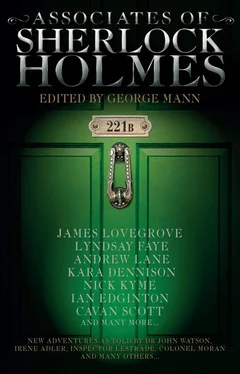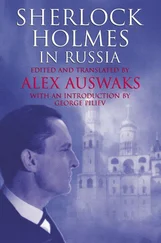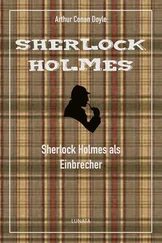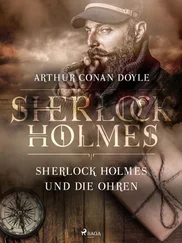“Exactly.” He shook his head in grudging admiration. I could see a half-smile on his face. “The problem with classic blackmail, of course, is that if a potential victim refuses to pay then there is precious little reason to go ahead and publish the incriminating material. The potential victim will certainly not pay after the event, so the action makes no profit while exposing the erstwhile blackmailer to risk. The only two reasons to go ahead are to take revenge on the potential victim for failing to co-operate and to provide an example for the next victim. This scheme, by contrast, warns the target in advance of what will happen to them if they do not pay.”
“How ingenious,” I said.
“Oh,” Holmes added, “and you were mistaken. In at least some cases the victims were forewarned. I deduce that this was to deliberately ‘soften them up’, as the phrase goes, and also to potentially avoid a needless shooting if they paid up promptly. However, knowing the blackmailer’s modus operandus gives us our chance to capture the villains behind this callous scheme.”
“How so?” I asked, realising as I did so that I was falling into the same role that Dr Watson played in this relationship – asking questions and making admiring statements.
“I had been wondering exactly how and why the blackmail victims were chosen. I deduced, in the end, that they were selected after their names appeared in one of the very newspapers for which you write your shoddy little columns.”
“Have a care, Holmes,” I murmured.
“In each case, the names of the blackmail victims appeared on the front page exactly five days before the deaths of the bystanders occurred. Inevitably, the appearance of the name was connected to some mention of their wealth or importance.”
“And so you have deduced the next potential blackmail victim,” I said.
“I have,” Holmes said. “It is –”
“– The Right Honourable Quentin Furnell,” I said.
Holmes gazed at me for a long moment. I think – I hope – he was surprised, although his expression rarely gives anything away. “You obviously recall that his name was on the front page in regard to a question raised over the large number of shares he has in a coalmining company whose business affairs he recently defended in Parliament,” he said eventually.
“And I also happen to know, based on the research I do for my ‘shoddy little columns’, that he will be attending a charity benefit at the Prince’s Theatre tonight. Given the five-day gap between the appearance of his name and the event, the conclusion seems obvious.”
“Can you obtain a ticket for me to this benefit?” Holmes asked. “I could ask my brother, but he would only tell me to stay out of the affair and pass my conclusions to the proper authorities.”
“Which raises the obvious question – why don’t you?”
He leaned back in the chair and put on an air of casual disinterest. “If I were the person who might end up in the sights of the blackmailing marksman,” he said, “I would prefer to think that my survival lay in the hands of Sherlock Holmes, not the Metropolitan Police.”
“Also,” I ventured, “despite Dr Watson’s curious belief that you care little for money, and undertake these cases for sport, in fact you are running a business, and if you can demonstrate to the Right Honourable Quentin Furnell that you have saved him from attempted blackmail then he might well divert a fraction of the money he would have spent on paying the blackmailer to your account. Better that than the Police Benevolent Fund.”
“Watson is curiously naïve about the way the world works,” he said softly, “and besides, I have found it best not to mention money too often in his presence. He has –”
“Issues to do with horses,” I murmured. “I quite understand.”
“And I am sure I can count on your discretion in this case,” he added.
“Mr Holmes, you of all people should know that I have no discretion. It is how I earn the money that keeps me in cake and sherry. In this case, however, I am pleased to make an exception.” I thought for a moment. “Yes, I could obtain tickets for both of us, but alas they would not be near the Right Honourable Quentin Furnell, and thus we might be too far away to save the innocent victim. We would need to be close to Furnell, which means that we might have to take him into our confidence.”
“A fair point.” He grimaced. “As a rule, I am generally not in favour of telling those involved too much, but in this case it might be wise.”
And so it was that, several hours later, I found myself in the front row of the Circle of the Prince’s Theatre. Tragically, I was not wearing my finest evening dress – the one that has been known to make grown men weep with the extravagance of its material and the skill and daring of its cut. Neither was I wearing the deep violet cummerbund and bowtie that set it off so beautifully. Sadly, neither of those items were baggy enough to cover up the undergarment of varnished leather and multiple layers of silk that I was wearing underneath, which is why I was wearing a cheap ensemble of the kind that I would normally not have been seen dead in – an unfortunate phrase, I know, but it seems apposite. Following my intervention, Holmes had thrown himself wholeheartedly into a plan to catch the killer in the act without risking the life of a member of the public. With the baffled collaboration of the Right Honourable Gentleman in question, several of his party, including his stately wife and almost equally stately daughter, were dropped from the trip to the theatre, leaving several empty seats, while the occupied seats around him were filled with other agents and associates of Holmes wearing protection that would apparently be proof against bullets of the calibre used. I, sadly, was one of those associates, which meant I was sitting there sweating and looking almost as large as the Right Honourable Gentleman’s wife would have done.
“My research indicates that the marksman invariably shoots someone within six feet of his blackmail target,” Holmes assured me, “and one who is not related or known to the target. All of the seats within that range are occupied by my people. There is no risk to anyone else in the theatre.”
“If you are right,” I pointed out.
He looked at me as if he did not understand my words. “Of course I am right,” he said.
“I cannot help noticing that the protection is confined to my torso, leaving my head and limbs exposed.”
“The marksman has, to date, always shot the body rather than the head. The body is a larger target, of course, but there may also be an intention to make it less obvious that something has happened. With a bullet to the body, the victim slumps or falls, and that might be blamed on all manner of things. With a shot to the head the effects are… let us say… considerably less ambiguous.”
The performance was a collation of short scenes from Shakespeare, Marlowe and Johnson, interspersed with sonnets set to music by various well-known composers. It was not really my cup of tea. I spent much of the first half surreptitiously gazing around the theatre looking for the marksman, knowing that Holmes would be restlessly exploring the front and rear of house.
And all the time I was anticipating the impact of a bullet to my chest or, worse, to my head. I was sure I could trust Holmes’s deductive powers, but it was not him the killer was aiming at.
Two seats to my right, Quentin Furnell was looking distinctly sick. He kept sipping from a hip flask; I thought I could smell brandy. I noted that down for future use.
It was during a dramatic interpretation of the storm scene from King Lear that I noticed something amiss. To each side of the stage and further back, above the second box on either side, incandescent electrical spotlights were being controlled by men in hanging chairs. They were dressed entirely in black, so as not to distract the audience from events occurring on stage, but that process seemed to be breaking down on my right, where one of the spotlight operators was engaging in a tussle with a man who had apparently climbed down from the upper circle and clambered across to the spotlight. The tussle was causing the light to swing wildly around. I realised two things simultaneously: the man who had clambered down from the Upper Circle and instigated the fight was Holmes; and the man he was fighting with was clutching what appeared to be a rifle.
Читать дальше












